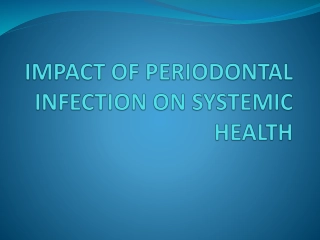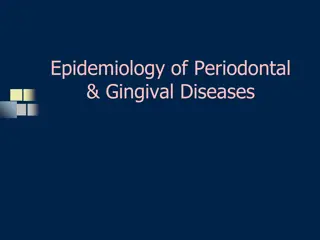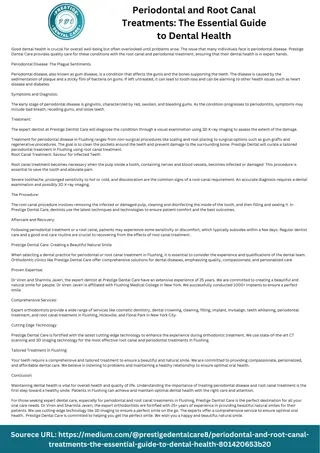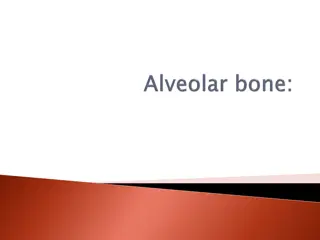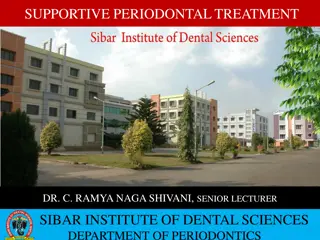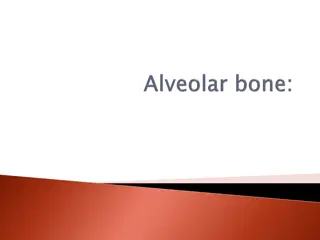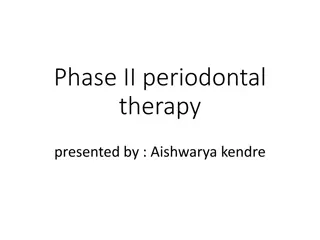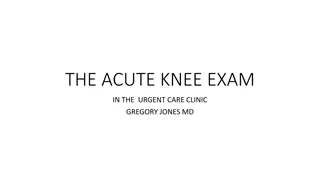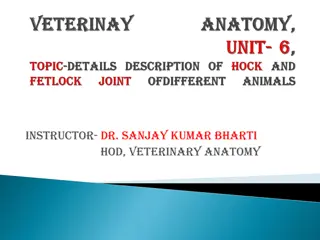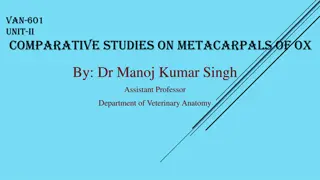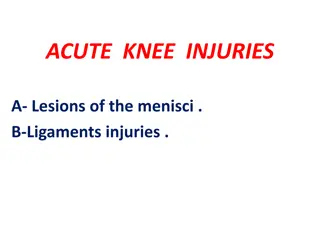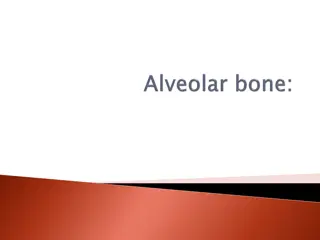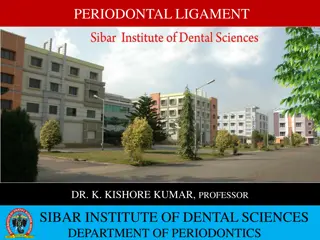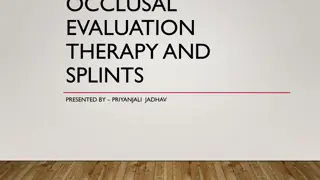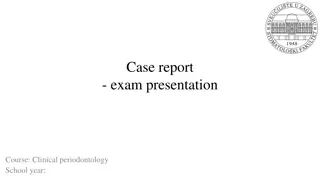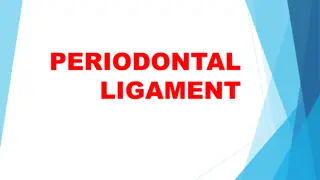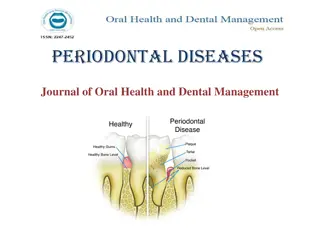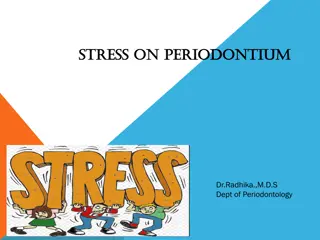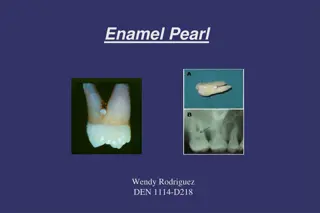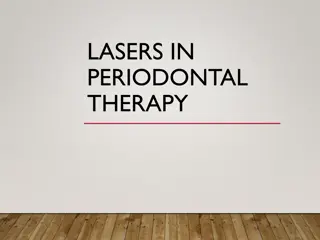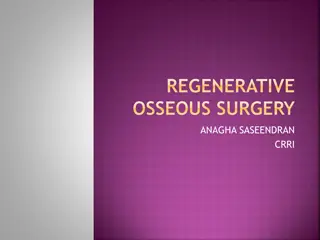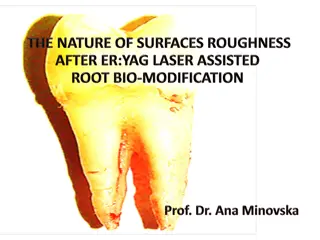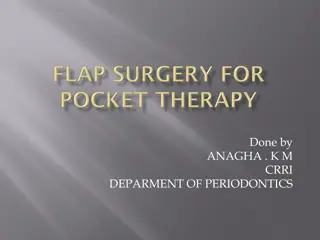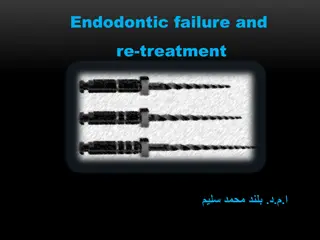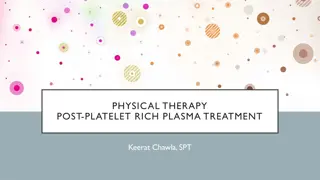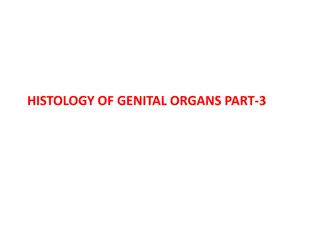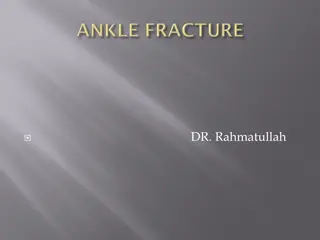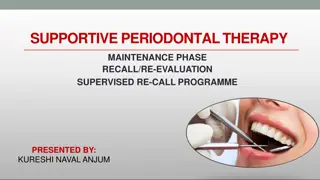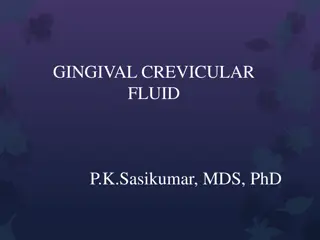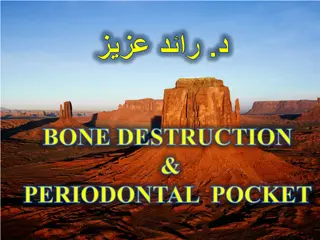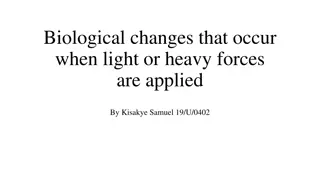Uncovering the Impact of Periodontal Disease on Health
Delve into the interconnected relationship between periodontal disease and mortality, coronary heart disease, stroke, diabetes, pregnancy, COPD, and acute respiratory infections to enhance awareness and understanding for better health outcomes.
2 views • 46 slides
Periodontal Treatment Considerations for Medically Compromised Patients
Patients with significant medical conditions may require special considerations for periodontal treatment. Medical issues such as hemorrhagic disorders, renal diseases, liver diseases, pulmonary diseases, infectious diseases, pregnancy, medications, and cancer therapies can impact oral health and tr
1 views • 87 slides
Epidemiology of Periodontal & Gingival Diseases
Epidemiology is the study of disease distribution and determinants in populations for effective control and prevention. It plays a crucial role in understanding the prevalence, risk factors, and effectiveness of preventive measures for periodontal and gingival diseases. Classification systems and th
3 views • 63 slides
Understanding Kinesiology Taping Techniques and Benefits
Kinesiology taping is a technique utilizing thin, flexible tape to relieve pain, reduce swelling, and provide support to muscles and joints. Introduced by Dr. Kenzo Kase in the 1970s, it includes techniques such as muscle, ligament, fascial, correction, lymphatic drainage, and functional movement te
8 views • 14 slides
Physiotherapy Rehabilitation for Post Ligament Injury - Varsha Jalandhara, DPT
In the acute stage of post-ligament injury, physiotherapy focuses on reducing inflammation and pain through techniques like cryotherapy and protective measures. As the injury progresses to the sub-acute stage, mobilization and strengthening exercises are gradually introduced to improve range of moti
2 views • 26 slides
Periodontal and Peri-Implant Surgical Anatomy Overview
Sound knowledge of the anatomy of the periodontium and surrounding tissues is essential for successful periodontal and implant surgical procedures. This includes understanding the mandible and maxilla anatomy, muscles, anatomic spaces, and landmarks like the mandibular canal. Proper awareness can he
9 views • 41 slides
Periodontal and Root Canal Treatments The Essential Guide to Dental Health
Discover expert periodontal treatment at Prestige Dental Care in Flushing. Our skilled team provides advanced care to maintain healthy gums and prevent gum disease. For detailed information on our services and personalized treatment plans, download the PDF now and take the first step towards optimal
1 views • 1 slides
Understanding the Role of Alveolar Process in Dental Development
The alveolar process in the upper and lower jaw plays a vital role in housing, supporting, and protecting teeth. It anchors tooth roots, facilitates tooth movement for proper occlusion, absorbs and distributes occlusal forces, supplies vessels to the periodontal ligament, and aids in tooth eruption.
1 views • 28 slides
Understanding Supportive Periodontal Treatment in Periodontics
Supportive Periodontal Treatment (SPT) is a crucial phase in periodontal therapy aimed at preventing disease recurrence and tooth loss. It involves regular maintenance and monitoring to manage periodontal conditions effectively. SPT includes thorough examinations, radiographic reviews, and prophylax
1 views • 61 slides
Anatomy of the Upper Limb: Clavicle, Scapula, Humerus
The upper limb anatomy includes detailed descriptions of the clavicle, scapula, and humerus bones. The clavicle is a long bone that articulates with the sternum and scapula, while the scapula lies on the posterior chest wall and has important bony landmarks like the acromion and glenoid cavity. The
2 views • 15 slides
Structure and Functions of the Alveolar Process in Jaw Anatomy
The alveolar process in the upper and lower jaw is responsible for housing the roots of teeth, supporting tooth eruption, providing attachment for facial muscles, and aiding in mastication. During fetal development, the alveolar process forms and separates tooth germs, leading to the differentiation
2 views • 26 slides
Comprehensive Overview of Phase II Periodontal Therapy
Explore the phases, objectives, and treatment methods of Phase II periodontal therapy, including surgical interventions, pocket therapy, and indications for surgery. The treatment plan involves emergency care, nonsurgical therapy, surgical procedures, restorative treatments, and maintenance protocol
1 views • 47 slides
Comprehensive Guide to Acute Knee Examination in Urgent Care
This detailed guide covers the essential components of the acute knee exam conducted in an urgent care setting by Dr. Gregory Jones, including chief complaints, anatomy, examination techniques, ligament assessments, practical aspects, and more. The examination process involves assessing functional l
1 views • 27 slides
Veterinary Anatomy: Tarsal Bone Structure and Ligaments
Veterinary anatomy lesson featuring the composite joint of the tarsus in an ox, detailing the arrangement of short bones in the tarsus and the ligaments involved. Images and descriptions explain the composition of the composite joint, the types of movements it allows, and the ligaments supporting it
3 views • 28 slides
Comparative Studies on Metacarpals of Ox
This study examines the metacarpal bones of ox, focusing on the large metacarpal and the lateral small metacarpal. The large metacarpal consists of a shaft with distinct surfaces and borders, while the proximal and distal extremities have specific features for articulation and ligament attachment. T
4 views • 13 slides
Understanding Acute Knee Injuries: Meniscal Tears and Ligament Injuries
Acute knee injuries, such as meniscal tears and ligament injuries, are commonly caused by trauma or twisting motions. Meniscal tears can lead to pain, swelling, and locking of the knee joint, especially in young active individuals. Understanding the anatomy of the knee joint and meniscus, along with
0 views • 56 slides
Understanding the Role of Alveolar Process in Dental Support
The alveolar process in the upper and lower jaw plays a crucial role in supporting teeth, anchoring them to the alveoli with Sharpey's fibers. It helps in tooth movement for proper occlusion, absorbs and distributes occlusal forces, supplies vessels to the periodontal ligament, and protects both pri
2 views • 42 slides
Understanding the Defense Mechanism of Gingiva and Collection of Gingival Crevicular Fluid
Explore the intricate defense mechanisms of the gingiva against bacterial aggression and mechanical trauma. Learn about the collection methods and analysis of gingival crevicular fluid for understanding periodontal health. Discover the composition, role, and permeability of compounds in the gingival
0 views • 41 slides
Understanding the Periodontal Ligament in Dental Sciences
The periodontal ligament (PDL) is a vital connective tissue that supports teeth by attaching them to the jaw bone. It consists of various tissues including cementum and alveolar bone, and is rich in vascular and cellular components. The development of PDL fibers plays a crucial role in tooth support
1 views • 39 slides
the cruciates. the best acl ligament surgeon in delhi
for more info, make sure to visit: \/\/thecruciates.com\/the-best-acl-surgeon-in-delhi-ncr\/
1 views • 1 slides
Understanding Occlusal Evaluation, Therapy, and Splints
Occlusal evaluation, therapy, and splints play a crucial role in assessing and treating occlusal function and dysfunction. The relationship of occlusion to periodontal health, forces during jaw movements, and the biologic basis of occlusal function are discussed. The importance of balancing occlusio
0 views • 48 slides
Ankle Injuries and Pain Overview - MD Pediatric Orthopedics
Explore the causes, types, and treatment of ankle injuries and pain, focusing on sprains, fractures, and impingement issues. Discover insights on ankle sprains in children and adults, ligament anatomy, common injury mechanisms, and essential ligaments involved. Gain valuable information on distingui
0 views • 55 slides
Comprehensive Clinical Periodontology Case Study Presentation
This comprehensive clinical periodontology case study presentation includes detailed information on the patient's general and dental history, oral hygiene assessment, periodontal diagnostics, radiographic analysis, occlusion evaluation, periodontal risk assessment, diagnosis, therapy plan, surgical
0 views • 15 slides
Understanding Periodontal Ligament: Composition, Functions, and Structure
The periodontal ligament (PDL) is a complex tissue that surrounds a tooth root and connects it to the alveolar bone. It plays a crucial role in tooth support and function. This comprehensive guide covers the composition, principle fibers, blood supply, nerve supply, and lymphatic drainage of the PDL
2 views • 33 slides
Understanding Periodontal Diseases and Their Management
Periodontal diseases affect the supporting structures of teeth and can be caused by bacterial plaque accumulation and host immunological factors. Types of periodontal diseases include gingivitis, herpetic gingivostomatitis, acute necrotising gingivitis, periodontitis, and aggressive periodontitis. P
0 views • 10 slides
Understanding the Impact of Nutrition on Periodontal Disease
Periodontal disease, like caries, is multifactorial and influenced by the balance between bacterial challenge and host defense. Nutritional factors play a subtle but significant role in maintaining periodontal health. A deficiency in nutrients can adversely affect the periodontal tissues and modify
0 views • 23 slides
Understanding the Impact of Stress on Periodontal Health
Periodontitis is a complex disease influenced by various factors, including stress. Chronic stress can negatively affect the immune response, leading to periodontal breakdown. This article explores the relationship between stress and periodontal health, discussing the mechanisms of action, effects o
2 views • 47 slides
Understanding Enamel Pearl Anomaly in Dentistry
Enamel Pearl is a developmental anomaly where small nodules of enamel form below the cemento enamel junction, mainly on permanent teeth. This anomaly, detected radiographically, can lead to bacterial accumulation, periodontal issues, and inflammation if left untreated. Dental hygienists play a cruci
0 views • 8 slides
Understanding Lasers in Periodontal Therapy
Laser technology in periodontal therapy harnesses the energy of photons to provide precise and effective treatment. Originally developed as MASER, the laser produces monochromatic, coherent light with unique properties such as directionality. Key components include the active medium, power supply, a
4 views • 58 slides
Understanding Regenerative Osseous Surgery in Periodontal Therapy
Regenerative osseous surgery is a procedure aimed at reshaping the alveolar bone to correct deformities caused by periodontal disease. This comprehensive guide covers the definition, types, indications, and contraindications of osseous surgery, emphasizing the goal of achieving ideal periodontal reg
0 views • 26 slides
Understanding Root Surface Modifications in Periodontal Therapy
Periodontal therapeutic modalities focus on root surface modifications due to periodontitis, which involves physical, chemical, and cytotoxic changes. Successful outcomes depend on factors like clot stability, cell migration, attachment, proliferation, and debridement. Analyzing cementum properties
0 views • 6 slides
Understanding Periodontal Flap Techniques
Explore the classification and techniques of periodontal flaps for pocket therapy, including modified Widman flap, undispaced flap, and more. Learn about the importance of flap thickness, bone exposure, flap placement, and flap design in periodontal surgery. Discover the different types of pockets a
0 views • 25 slides
Evaluation of Success in Endodontic Treatment
Endodontic treatment success is crucial for patient well-being. Various criteria, including clinical, radiographic, and histological, are used to assess outcomes. Clinical signs like absence of pain and normal tooth mobility indicate successful treatment. Radiographic criteria involve checking for n
1 views • 44 slides
Platelet-Rich Plasma Therapy in Physical Therapy: Enhancing Recovery and Healing
Exploring the effectiveness of Platelet-Rich Plasma (PRP) treatment in combination with physical therapy for various musculoskeletal conditions like tendinopathy, ligament injuries, muscle strains, and osteoarthritis. The audience will gain insights into the benefits of PRP injections, suitable pati
0 views • 15 slides
Female Ovary Histology and Function Overview
The female reproductive organ, the ovary, plays crucial roles in oocyte development, hormone production, and ovulation. Structurally, ovaries have a cortex and medulla, with follicles containing oocytes and surrounding cells. The primary follicle marks the onset of follicular maturation, leading to
0 views • 12 slides
Comprehensive Overview of Ankle Fractures and Ligamentous Anatomy
Ankle fractures are more prevalent in elderly women, with isolated malleolar fractures being the most common type. Understanding the complex hinge joint and ligamentous structures of the ankle is essential for diagnosis and treatment. The syndesmotic ligament complex plays a crucial role in stabiliz
0 views • 44 slides
Supportive Periodontal Therapy: Maintenance and Supervision Overview
Supportive Periodontal Therapy (SPT) is a critical phase in periodontal care designed to assist patients in maintaining oral health, prevent disease recurrence, and preserve bone support. It involves a series of procedures performed at intervals to support the patient's efforts in controlling and av
0 views • 34 slides
Understanding Gingival Crevicular Fluid in Oral Health
Gingival crevicular fluid (GCF) is a crucial component in periodontal health, serving various functions such as cleansing the sulcus, enhancing epithelial adhesion, possessing antimicrobial and antibody properties. Factors influencing GCF production include capillary filtration and lymphatic uptake
0 views • 46 slides
Understanding Bone Destruction in Periodontal Disease
The progression of periodontal disease can lead to bone destruction in the alveolar bone, which is crucial in supporting teeth. The inflammatory process causes permanent damage to the periodontium tissues, resulting in connective tissue loss and bone resorption. Different patterns of bone loss, such
0 views • 14 slides
Understanding Biological Changes with Light or Heavy Forces Application
Tooth movement can be categorized as physiologic, pathologic, or orthodontic, with forces transmitted through the tooth to the periodontal ligament and alveolar bone. Changes occurring due to light and heavy forces result in bone resorption and deposition, impacting the supporting structures. Histol
0 views • 25 slides
